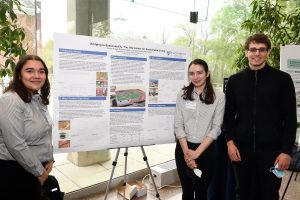
In a significant stride towards tailoring undergraduate education to address modern societal needs, the Department of Civil and Systems Engineering (CaSE) proudly introduces the Systems Engineering (SE) minor. Stemming from the SE Bachelor’s program launched in 2022, the minor transcends traditional engineering boundaries, offering students a trans-disciplinary approach spanning mathematics, engineering, social and physical sciences, public policy and health.
This addition to CaSE’s academic offerings addresses society’s evolving needs with the understanding that contemporary challenges require not just technological innovation, but effective and equitable implementations. The SE program provides students with knowledge of theory, computational methods, and research in the fundamental frameworks of optimization, network theory, data science and uncertainty quantification, providing the tools required to envision solutions to big-picture problems in a range of applications.
A notable feature of the program is its responsiveness to current global issues. From modeling and monitoring pandemics to optimizing resource allocation, designing resilient infrastructure systems, and building interconnected smart cities—the curriculum aligns with today’s pressing needs. “Systems engineering is a growing field that focuses on improving systems in our society. CaSE’s program is really unique because we strive to maximize hands-on learning. Students have told me how excited they are when they can use real data and work on real problems. I’ve seen them become intensely emersed in today’s challenges, while also practicing skills that will prepare them for their future careers,” explains Director of Undergraduate Studies for Systems Engineering and lecturer, Dr. Melissa Tilashalski.
Despite tackling such widespread societal challenges, SE programs remain limited in number. With CaSE’s program being one of a few of its kind, students can be confident in the skills they develop from our engaging faculty and classes, giving them a leading advantage for careers in growing fields such as future energy systems, smart cities, disaster mitigation and community resilience, and decision-making.